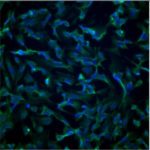Lien vers Pubmed [PMID] – 27581651
BMC Cancer 2016 08;16:700
BACKGROUND: In breast cancer, the epithelial to mesenchyme transition (EMT) is associated to tumour dissemination, drug resistance and high relapse risks. It is partly controlled by epigenetic modifications such as histone acetylation and methylation. The identification of genes involved in these reversible modifications represents an interesting therapeutic strategy to fight metastatic disease by inducing mesenchymal cell differentiation to an epithelial phenotype.
METHODS: We designed a siRNA library based on chromatin modification-related to functional domains and screened it in the mesenchymal breast cancer cell line MDA-MB-231. The mesenchyme to epithelium transition (MET) activation was studied by following human E-CADHERIN (E-CAD) induction, a specific MET marker, and cell morphology. Candidate genes were validated by studying the expression of several differential marker genes and their impact on cell migration.
RESULTS: The screen led to the identification of 70 gene candidates among which some are described to be, directly or indirectly, involved in EMT like ZEB1, G9a, SMAD5 and SMARCD3. We also identified the DOT1L as involved in EMT regulation in MDA-MB-231. Moreover, for the first time, KAT5 gene was linked to the maintenance of the mesenchymal phenotype.
CONCLUSIONS: A multi-parametric RNAi screening approach was developed to identify new EMT regulators such as KAT5 in the triple negative breast cancer cell line MDA-MB-231.

